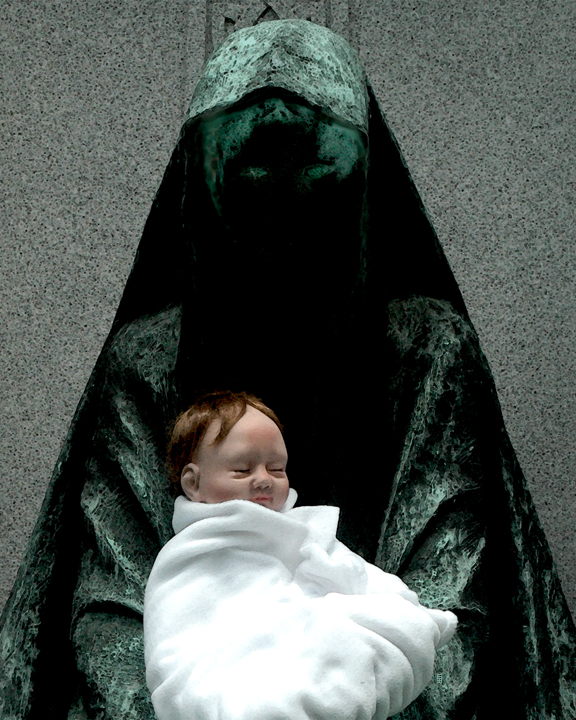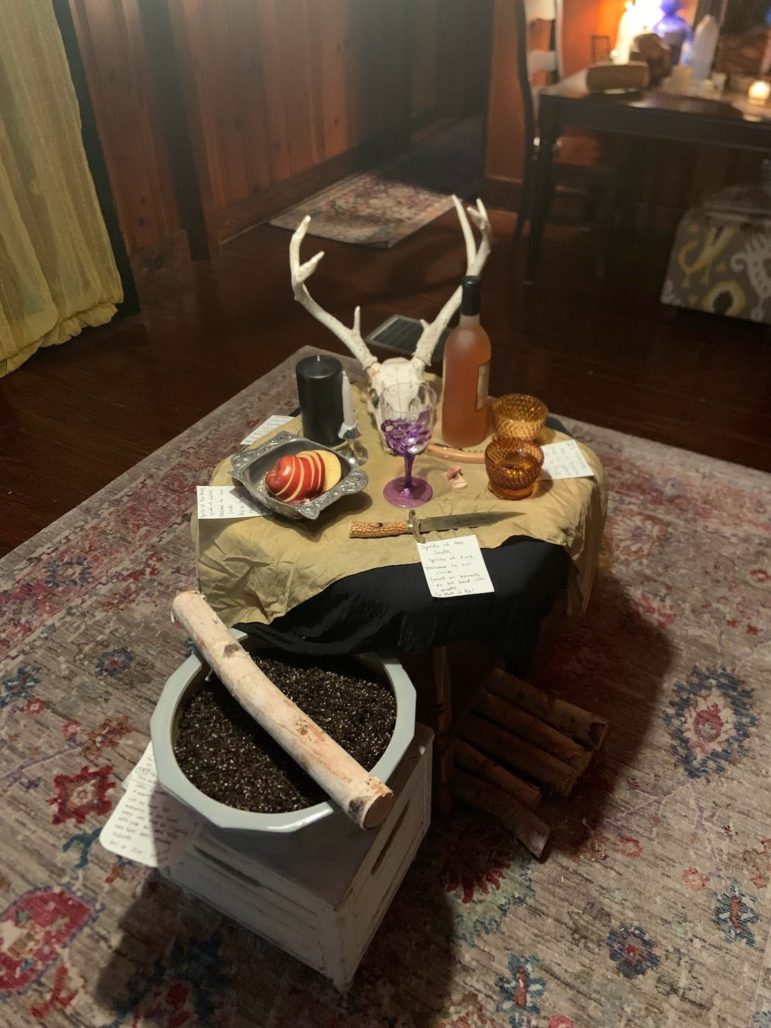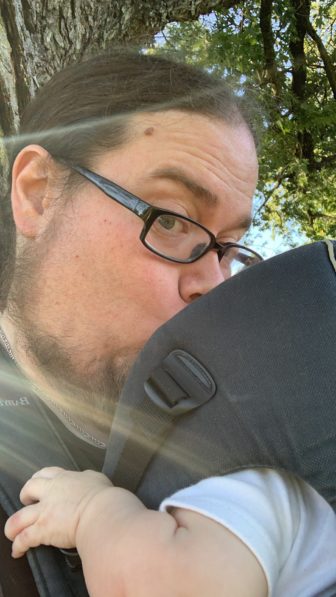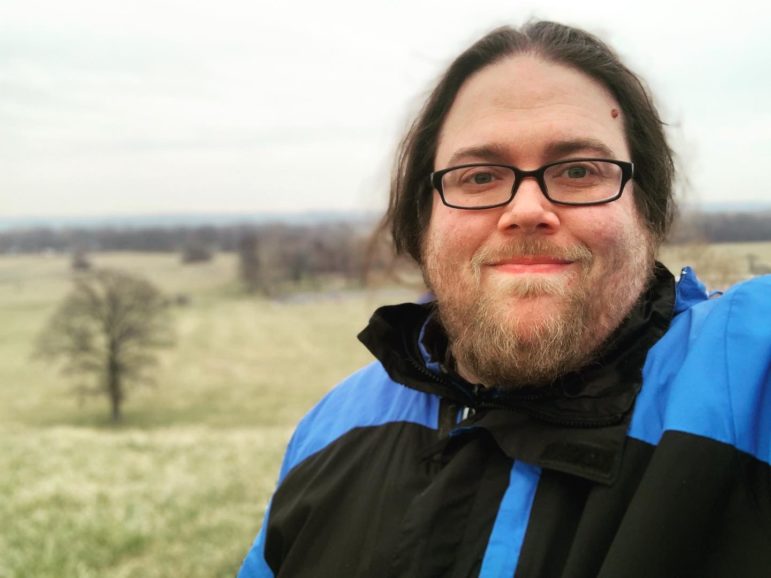
Note: This column mentions a school shooting and the death of a young person.
It is a commonplace in St. Louis, my hometown, that one question is sure to come out of anyone’s mouth upon introduction: “where did you go to high school?” Like so many other cliches of the place, such as our supposed pronunciation of the highway “forty-four” as “farty-far,” I never really hear this said aloud without a hint of irony. But inasmuch as the school we go to is shorthand for the neighborhood in which we grew up, for economic class, ethnic background, religion – for the circumstances of our social world, in short – the commonplace remains. In a city big enough to have these distinctions and small enough to know what every school says about them, more often than not we do reach for the old saw.

The Gifts of Madame Death [W. Scott, courtesy]
I went to Metro, a small public school in the city’s magnet program, the “college prep” school. But many of my friends went to Central, a little larger, which was focused on visual and performing arts. Though Metro was colloquially the “better school,” I remember being jealous of the classes my friends at Central got to take: full programs in theatre, dance, or music that were beyond the capacity of Metro.
My friend with the great punk rock band went to Central; the girl I took to prom went there, too. The school is even housed, now, in the building where my father went to high school in the 1970s. So although I never attended a class there, it is a place I know and feel fondly toward, the way one might feel about the home of a friend’s parents.
On a Monday morning in late October, a young man who had graduated from Central the year prior entered the school and killed a teenage girl and a health teacher. Seven others suffered injuries: shrapnel, broken ankles, bullet wounds, and a heart attack. The police shot the 19-year-old dead. He had been armed – as the shooter in Uvalde had been in May, as so many have been armed in the United States’ growing ledger of school shootings – with an AR-15 rifle, originally designed as the primary weapon for America’s Cold War adventures.
As the news trickled in that morning, I did not find myself thinking about a shooting happening at one of the schools I work in today, in my day job as a union representative. Instead, I found myself back in Metro’s corridors, thinking of myself as I was at 17, wondering what I would have done if I had heard this had happened to my friends at Central.
Two days later, a cousin of mine passed away. We were not close; he was 16 years younger than me, a relative who I only saw at the occasional family reunion and in passing on Facebook. But I liked what little I knew of him. He had been a big man, tall and stocky, but his face was boyish and set with sad eyes. Somebody in the rural area in which he lived had apparently sold him a bad dab – that is, a concentrated form of THC formed by pouring butane over marijuana – and it had caused him to die of organ failure.
I rode to the funeral that weekend with my father, who had known him better than me. I saw a constellation of relatives there in the unfamiliar sky of the funeral parlor. I saw my great uncle, my grandfather’s last surviving brother, and my great aunt, and so many cousins, all of whom wanted to hear about my baby, who my father shares so many pictures of with such pride. I saw my cousin’s mother, so composed, so determined to make it through the day before she would allow herself to break down. I saw my cousin’s sister, and her boyfriend, and all of my cousin’s friends struggling in uncomfortable ties and button-ups, people too young to be attending such a thing.
The preacher admitted that he had little to say about my cousin beyond what was written in the obituary. He had loved video games; he had played tuba in the band; he had died too young; he had his whole life ahead of him. What could be said to fill that space?
We left the funeral and went straight to our coven’s Samhain festival, where my wife was already waiting for us. We still had a few minutes before the ritual when we arrived. I went to my wife and took the baby from her, and I held the baby tight against me for as long as I could.

Sabbatsmeet Samhain altar, 2022 [E. Scott]
There is an anecdote in the first chapter of my favorite book about writing, William Zinsser’s On Writing Well, in which Zinsser recounts an occasion where he and a surgeon-turned-writer, “Dr. Brock,” were invited to speak to students at a school in Connecticut:
Dr. Brock was dressed in a bright red jacket, looking vaguely bohemian, as authors are supposed to look, and the first question went to him. What was it like to be a writer?
He said it was tremendous fun. Coming home from an arduous day at the hospital, he would go straight to his yellow pad and write his tenions away. The words just flowed. It was easy. I then said that writing wasn’t easy and wasn’t fun. It was hard and lonely, and the words seldom just flowed.
[…]
So the morning went, and it was a revelation to all of us. At the end Dr. Brock told me he was enormously interested in my answers – it had never occurred to him that writing could be hard. I told him I was just as interested in his answers – it had never occurred to me that writing could be easy. Maybe I should take up surgery on the side.
I have always felt more kinship with Zinsser than with Dr. Brock. There were times when I first began to write seriously, that I had the flights of wonder and flow that Dr. Brock describes, but for the most part, I have always found writing an arduous task, hardly any easier on a word processor than if I were chiseling the words out in granite. When I taught creative writing, I would, like every other writing teacher, recite the mantra of the field, “don’t get it right, get it written,” but I confess I never could apply this to my own practice. Other writers tell me about their schedules, and how they won’t let themselves have a cup of coffee before the first thousand words for the day are down. If I held myself to that standard, I would be lucky to have my first cup with dinner, and even that only a few days a month.
Nonetheless, what I lack in speed, I sometimes make up for in perseverance. Ten years ago, Jason Pitzl-Waters, the founder of The Wild Hunt, sent me a message, saying he was considering hiring a couple of columnists and wondering if I would like to be one of them. On November 16, 2012, I published my first piece here, a column about a different Samhain and a different baby. I have published a column here (nearly) every month ever since.
It has not been the most successful regular feature on The Wild Hunt; in the past decade, I can’t think of many times something I have written here has gone viral, or become the main topic of discussion in the Pagan blogosphere and its successors on Facebook, Tumblr, or WitchTok. Still, I have often received appreciative notes about my work, and sometimes strongly-worded arguments about it, and if every word and comma has been a struggle to put into place in the writing of it, there are still many pieces I am proud to have written. As a body of work, I think it stands up to any other collection of Pagan prose in the past decade.
There are trends in the column that I can see now that were not always apparent in the moment. Many of my early columns were not just introducing myself and my family coven, Pleiades, and the larger group of covens with which celebrate the Wheel of the Year, Sabbatsmeet; they were also my way of preparing myself for moving away from St. Louis and from Sabbatsmeet, for what I thought would be for good, to get a Ph.D. at the University of Missouri.
The column was with me all through my Ph.D. years, accommodating the various fascinations that came up in the course of that work – how to worship inside of a museum, or how Paganism and mythology are represented in games, or my travelogs in Iceland and England, which eventually became my dissertation. It was there when I had a car accident that I’m still surprised didn’t kill me. It was there when I found myself part of a national story at Mizzou, as graduate students struggled for a union and for racial justice. It was with me as I figured out my life after I left academia. And now it has been with me as I have become a father, wondering how I am to raise a third generation in our Pagan tradition when Paganism still has so little conception of those of us in the second.

Eric Scott and his child [E. Scott]
At just about this time last year, I was laying on a mattress in the room that would, in a few months, become my child’s bedroom. I had caught COVID-19 and I isolated myself from my pregnant partner. I hated being apart from her, but in some ways, it was useful; I appreciated having a bit of time to myself, to think about the future, and to work on recording a song.
I have played the guitar since I was 15, though I have never gotten especially good at it; I had never actually studied a guitar scale until just a few years ago, and prior to that I had gotten by on enthusiasm and some punk bravado, which is a less endearing musical trait in one’s mid-thirties. I had picked up some recording equipment and a new guitar earlier in the pandemic and fiddled around with recording new versions of some of the songs I had written for the band I’d been in when I was in my 20s.
Writing music, like writing prose, does not come easily to me; my ambitions often outpace my capabilities. But I’d had a musical epiphany, the first one to come to me in years – a set of lyrics that fell into my head as if from the gods. I wrote them down as quickly as they came to me:
I don’t believe that anything is fated.
I don’t believe that the bills will come due.
I don’t believe that there’s an arc to creation.
I don’t believe wishes really come true.
All we get is what we’ve given,
And I’ve given all that I have to you.
I’ve got no faith in democratic systems.
I’ve got no faith in either means or ends.
I’ve got no faith our institutions will save us.
I’ve got no faith that we will make amends.
This dust we are is where returning,
But my faith in you is something that transcends.
When I was young, I was so headstrong –
I knew the difference between false and true.
Give me a reason to keep on believe –
If I must believe in something I’ll believe in you.
I think the future is a poem unwritten.
I think the future is in need of repairs.
I think the future is no place to raise children.
I think the future doesn’t listen to prayer.
The past is gone, the present’s burning.
But the future’s waiting, and I’ll meet you there.
The influences all stick out to me like proud nails: Nick Cave’s “Into My Arms,” John Lennon’s “God,” and half a dozen others. But it was the first new song I had written in a long time, and it was an honest one. I called it “Negative Confession,” after the list of sins the dead petitioner must attest she has not committed in the Egyptian afterlife.
I texted one of my partners and read her the lyrics. The ambiguity is deliberate, I said. I wanted it to be interpretable as a few different things – a lover, or the working class, or –
“It is the baby, of course,” she said. “Inevitably it is the baby.” And of course, she was right.
We lay down tracks, chords and lyrics and fumbling leads, or we lay down sentences and paragraphs, and we hope it all amounts to something in the end, something that will say to other people that we were here, and that we were human, and that there was something in our hearts that was worth putting down. Every letter written is addressed to the future. Who will read them is beyond our control.
It has been two months since Samhain, but I am still thinking about it, and the week leading up to it, still thinking about my cousin and the girl at Central and the health teacher, about how tenuous it all is. I am thinking – how could I not – of what life will be like for my child when he is my age if he is my age. I am thinking –

Eric Scott standing atop Monk’s Mound on the day after the Winter Solstice, 2022 [E. Scott]
I am thinking of the day after the solstice when I woke up with the baby before dawn. After the day’s first bottle, I drove in the darkness to the ancient city of Cahokia, which I visit every year to watch the sunrise after the long night atop the great earthwork called Monk’s Mound. It was cloudy this year, and so there was no great light show as the reborn sun appeared over the horizon and dispelled the dark, but only a sort of hazy gloaming, the yellowish purple of the night giving way to the purplish yellow of the day.
It was enough. The sun returns. The future is still there. And if it is all so frightening and fragile, it is also all we have.
I watched the sky for an hour, until I had finished my thermos of coffee, and then walked back down the mound to my car. A cold front was coming in, and I still needed to brave the grocery store and the horde of St. Louisians also scrambling after their necessary supplies of milk, bread, and eggs.
And then I needed to get home. My baby was there, waiting for me.
Author’s note: This will be my last regular column for The Wild Hunt, at least for a while. I’d like to thank my colleagues, my editors – Jason Pitzl-Waters, Heather Greene, and Manny Tejeda Moreno – and most especially the readers. It has been my honor and privilege to write this column for you.
Editorial note: Thank you, Eric!
The Wild Hunt is not responsible for links to external content.
To join a conversation on this post:
Visit our The Wild Hunt subreddit! Point your favorite browser to https://www.reddit.com/r/The_Wild_Hunt_News/, then click “JOIN”. Make sure to click the bell, too, to be notified of new articles posted to our subreddit.